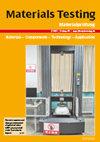膨胀聚丙烯泡沫填充碳/玻璃纤维复合管的侧向压缩性能
IF 3.5
4区 材料科学
Q2 MATERIALS SCIENCE, CHARACTERIZATION & TESTING
引用次数: 0
摘要
摘要通过侧压试验研究了内支聚丙烯(EPP)泡沫圆复合材料管的耐撞性和变形特性。使用密度分别为30、60和75 kg·m−3的碳纤维(CFRP)和玻璃纤维/环氧树脂(GFRP)复合材料和EPP泡沫。结果表明,CFRP空管与GFRP空管吸收的能量基本相同;然而,由于GFRP管的重量较轻,与CFRP管相比,GFRP管具有更高的比能吸收值。EPP泡沫填充对CFRP管耐撞性的影响比GFRP管更显著。在75 kg·m−3 EPP泡沫填充时,CFRP管的比能吸收效果最佳,为2.67 J g−1;然而,60 kg·m−3 EPP泡沫填充样品在力效率方面表现出最好的结构。对于GFRP管,在60 kg·m−3 EPP泡沫填充样品时获得了所有耐撞性参数的最佳配置。结果表明,随着EPP泡沫密度的增大,复合管材的可破碎长度缩短。最后,复合材料管的变形行为表明CFRP管比GFRP管更脆。本文章由计算机程序翻译,如有差异,请以英文原文为准。
Lateral compression behavior of expanded polypropylene foam–filled carbon and glass fiber composite tubes
Abstract The crashworthiness and deformation behavior of circular composite tubes that were internally supported with expanded polypropylene (EPP) foams were investigated under lateral compression tests. Carbon woven (CFRP) and glass woven fiber/epoxy (GFRP) composites and EPP foam with densities of 30, 60, and 75 kg·m −3 were used. According to results, empty CFRP and GFRP tubes absorbed almost the same amount of energy; however, the GFRP tube had a higher specific energy absorption value due to its lower weight compared to the CFRP tube. EPP foam filling has a more significant effect on the crashworthiness of CFRP tubes compared to GFRP tubes. The best results in CFRP tubes, in terms of specific energy absorption, were obtained as 2.67 J g −1 at 75 kg·m −3 EPP foam-filled sample; however, 60 kg·m −3 EPP foam–filled sample exhibited the best configuration in terms of force efficiency. For the GFRP tubes, the best configuration was obtained at 60 kg·m −3 EPP foam–filled sample for all of the crashworthiness parameters. It is seen that the crushable length of composite tubes was shortened with the increase of EPP foam density. Lastly, the deformation behaviors of composite tubes showed that the CFRP tubes were more brittle than the GFRP tubes.
求助全文
通过发布文献求助,成功后即可免费获取论文全文。
去求助
来源期刊

Materials Testing
工程技术-材料科学:表征与测试
CiteScore
4.20
自引率
36.00%
发文量
165
审稿时长
4-8 weeks
期刊介绍:
Materials Testing is a SCI-listed English language journal dealing with all aspects of material and component testing with a special focus on transfer between laboratory research into industrial application. The journal provides first-hand information on non-destructive, destructive, optical, physical and chemical test procedures. It contains exclusive articles which are peer-reviewed applying respectively high international quality criterions.
 求助内容:
求助内容: 应助结果提醒方式:
应助结果提醒方式:


